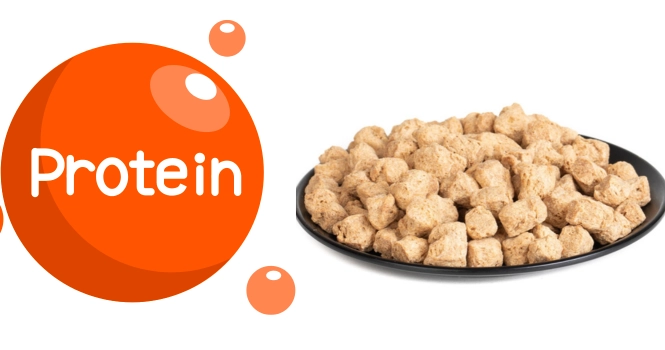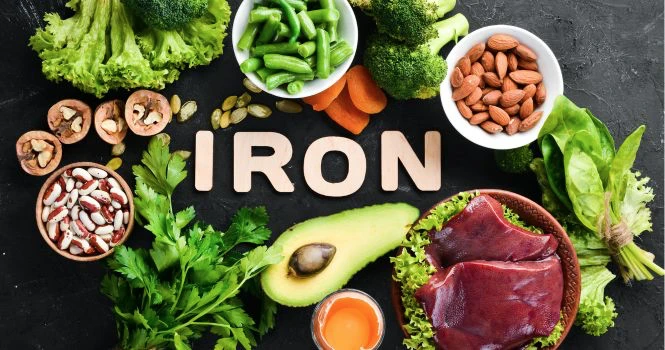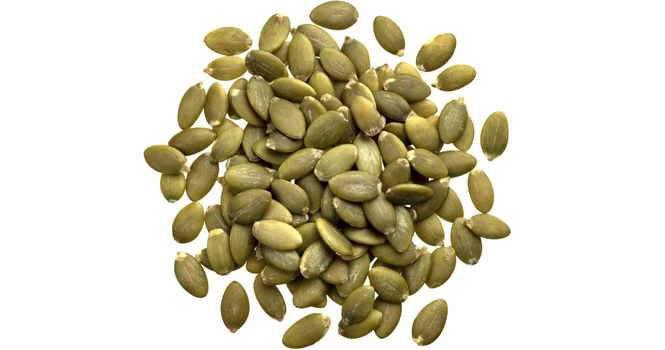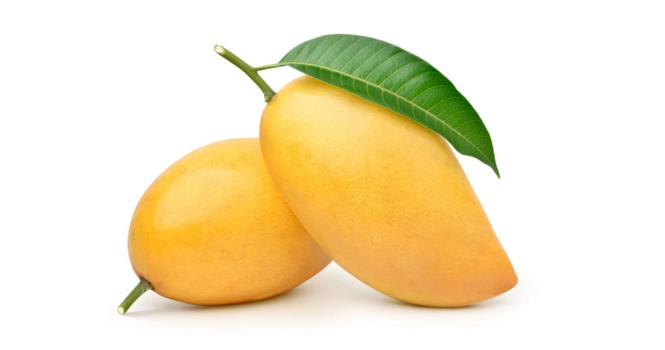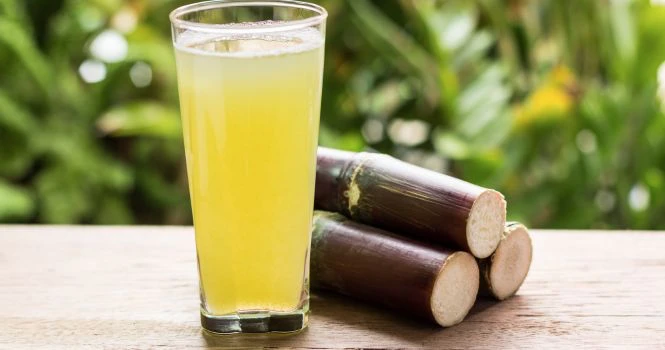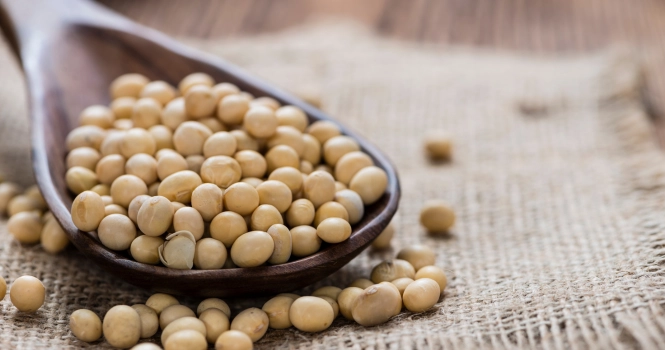Health Benefits of Cashew Nuts
When you visit a Standalone Dry Fruit shop, the salesman often tends to ask, the purpose of buying Cashew Nuts?
- Is it for the Guests for snacking?
- Is it for everyday consumption?
- Would you use it for cooking?
These are the grades of Cashews in the market
- W180
- W210
- W240
- W320j
- W450
W180 is a grade of cashew nuts based on their size and quality. The “W” stands for “whole,” and the number “180” indicates that there are approximately 180 cashew nuts per pound (454 grams).
W180 cashews are considered premium quality, as they are larger and visually appealing compared to other grades. They are often used in high-quality snacks or food products where presentation is important.
These codes represent different grades of cashew nuts based on their size and quality. The “W” stands for “whole,” and the number indicates the approximate number of cashew nuts per pound (454 grams).
Other different grades are:
W210: Slightly smaller than W180, these cashews have around 210 nuts per pound and are also considered high quality.
W240: This grade has approximately 240 cashew nuts per pound, offering a good balance of size and quality.
W320: With around 320 cashews per pound, this grade is smaller in size but still popular for various culinary applications.
W450: The smallest in this range, W450 cashews have approximately 450 nuts per pound and are often used in recipes where size is not a significant factor.
These grades help determine the appropriate use and pricing of cashew nuts in the market.
Larger cashews (like W180 and W210) are generally more expensive and used in premium products, while smaller cashews (like W320 and W450) are more affordable and versatile for various culinary purposes.
We will look into Nutrients in Cashews before going into their Health Benefits;
Nutritional information
| Nutrient | Amount per 1-ounce (28-gram) serving | % Daily Value (DV) |
| Calories | 157 | – |
| Protein | 5 grams | – |
| Total Fat | 12 grams | – |
| – Saturated Fat | 2.2 grams | – |
| – Monounsaturated Fat | 6.7 grams | – |
| – Polyunsaturated Fat | 2.2 grams | – |
| Carbohydrates | 9 grams | – |
| Fiber | 1 gram | – |
| Sugars | 1.7 grams | – |
| Magnesium | 82 mg | 20% |
| Phosphorus | 168 mg | 14% |
| Copper | 0.62 mg | 67% |
| Manganese | 0.47 mg | 20% |
| Zinc | 1.64 mg | 15% |
| Iron | 1.89 mg | 10% |
| Potassium | 187 mg | 4% |
| Selenium | 5.6 mcg | 10% |
| Vitamin K | 9.7 mcg | 8% |
| Thiamine (Vitamin B1) | 0.12 mg | 10% |
| Vitamin B6 | 0.1 mg | 6% |
Note: % of Dv is calculated for Calorie requirement of 2000 kcal per day
Where are Cashews grown and Cultivated?
They are grown in tropical regions, which is around the equator, where there are usually 2 seasons. The rainy season, when there is plenty of rainfall or the summer season, where there is hardly any rainfall.
The combination of high temperatures, abundant sunlight, and ample rainfall creates a suitable environment for Cashews to grow
Botanical Name
The botanical name for the cashew nut is Anacardium Occidentale.
The cashew tree, which belongs to the Anacardiaceae family, is native to the tropical regions of Brazil.
The cashew nut is actually a seed that develops within the cashew apple, an accessory fruit that grows on the tree.
The tree produces these seeds and fruits in abundance, making it a valuable source of nutritious nuts for cultivation and consumption around the world.
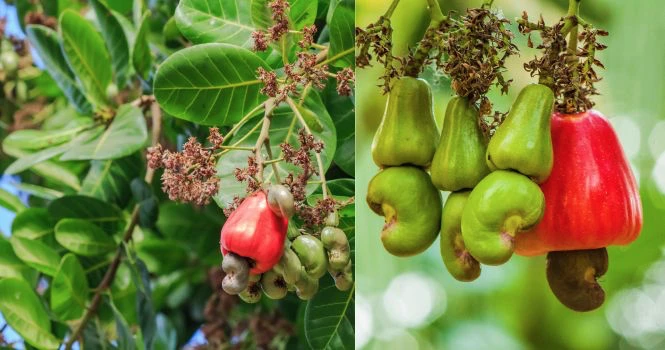
Is it okay to eat a Cashew Apple directly from the Tree?
Yes, it is okay to eat a cashew apple directly from the tree, as long as it is ripe and has been properly washed to remove any dirt or contaminants.
The cashew apple, which is the fleshy, colorful fruit that the cashew nut grows in, is edible and safe to consume. In fact, in many cashew-growing regions, cashew apples are eaten fresh, made into juices, jams, and chutneys, or used to produce alcoholic beverages like cashew wine or feni.
However, it’s important to note that the cashew apple has a delicate skin and can bruise easily, so it should be handled with care.
Additionally, cashew apples have a unique taste that may not appeal to everyone – they are sweet and slightly astringent due to the high tannin content.
Now, What about the Raw Cashew Nut, plucked directly from the tree? Which leads us to the next question,
Are raw cashews safe to eat?
When it comes to the cashew nut itself, you should not eat it directly from the tree without processing.
The cashew nut shell contains a thick, caustic oil called cashew nut shell liquid (CNSL), which is composed of various substances, including anacardic acid.
When the cashew shell comes into contact with skin, the anacardic acid can cause contact dermatitis, an allergic reaction characterized by redness, itching, and blisters.
For this reason, cashew nuts must be processed before they can be safely consumed. The processing methods, such as roasting, boiling, or steaming, help to remove the toxic shells and eliminate the anacardic acid, rendering the cashew nuts safe to eat.
Do cashews raise your blood sugar?
No, they don’t if consumed in moderation.
| Property | Value |
| Glycemic Index (GI) | Low (≤ 55) |
| Glycemic Load (GL) | Low (≤ 10) |
| Serving Size | 1 oz (28 grams) |
Cashews have a low glycemic index (GI) and glycemic load (GL), which means they have a minimal impact on blood sugar levels when consumed in moderate amounts. Including cashews in your diet can help maintain stable blood sugar levels, especially when combined with other low GI foods.
Health Benefits
Cashew nuts are nutrient-dense and offer numerous health benefits when consumed as part of a balanced diet. Some of the key health benefits of cashew nuts include:
1. Heart health: Cashews are rich in healthy monounsaturated and polyunsaturated fats, which can help lower LDL (bad) cholesterol and increase HDL (good) cholesterol levels, reducing the risk of heart disease.
2. Weight management: The combination of healthy fats, protein, and fiber in cashews can help you feel full and satisfied, potentially aiding in weight management when consumed in moderation.
3. Blood sugar control: Cashews have a low glycemic index and are a good source of dietary fiber, which can help regulate blood sugar levels and reduce the risk of type 2 diabetes.
4. Bone health: Cashews are a good source of magnesium, which plays a vital role in maintaining strong and healthy bones, as well as preventing conditions such as osteoporosis.
5. Immune function: Cashews are rich in essential minerals like zinc and copper, which support a healthy immune system and help protect the body from infections and diseases.
6. Brain health: The healthy fats, vitamins, and minerals in cashews, such as copper and magnesium, contribute to brain health and may help reduce the risk of age-related cognitive decline.
7. Anemia prevention: Cashews contain iron, which is necessary for the production of hemoglobin, a protein in red blood cells that transports oxygen throughout the body. Consuming iron-rich foods like cashews can help prevent iron-deficiency anemia.
8. Eye health: Cashews contain antioxidants, such as lutein and zeaxanthin, which can help protect the eyes from oxidative stress and age-related macular degeneration.
9. Skin and hair health: The healthy fats, vitamins, and minerals in cashews, such as copper, contribute to healthy skin and hair by promoting collagen production and protecting against oxidative stress.
10. Antioxidant properties: Cashews are a source of various antioxidants, such as vitamin E, which help protect cells from damage caused by free radicals and reduce inflammation in the body.
Incorporating cashews into your diet can provide numerous health benefits due to their rich nutritional profile. However, it’s essential to consume them in moderation, as they are high in calories and can contribute to weight gain if consumed in excessive amounts.
How to Incorporate Cashew Nuts in Your Diet?
Incorporating cashew nuts into your diet is easy due to their versatility and delicious taste.
Here are some ideas on how to include cashews in your meals and snacks but remember to consume in moderation;
1. As a snack: Enjoy raw or roasted cashews as a nutritious and satisfying snack. You can also try flavored cashews, such as those seasoned with herbs, spices, or honey, for added variety.
2. In salads: Add cashews to salads for an extra crunch and boost of healthy fats, protein, and essential nutrients. You can use whole cashews or chop them up for a more subtle texture.
3. In cooking: Use cashews in stir-fries, curries, and rice dishes to add texture, flavor, and nutrition. They work particularly well in Asian and Indian-inspired recipes.
4. In baking: Incorporate cashews into cookies, muffins, cakes, and other baked goods for added richness, texture, and a hint of nutty flavor.
5. As a nut butter: Make your own cashew butter or purchase it premade to use as a spread on toast, in sandwiches, or as a base for sauces and dressings.
6. In dairy alternatives: Blend soaked cashews with water to create cashew milk, which can be used as a dairy alternative in smoothies, coffee, or cereal. You can also use cashews to make dairy-free cheese, cream, and sauces.
7. In desserts: Use cashews in the base of raw vegan desserts, such as cheesecakes, tarts, or energy bars, for a creamy and nutritious alternative to traditional ingredients.
8. As a topping: Sprinkle cashews on top of oatmeal, yogurt, or smoothie bowls for added texture, flavor, and nutrition.
9. In dips and spreads: Blend cashews with other ingredients to create creamy and delicious dips or spreads, such as cashew cheese, cashew-based hummus, or cashew pesto.
10. As a garnish: Toast cashews and use them as a garnish for soups, roasted vegetables, or desserts to add an appealing touch and extra flavor.
Side Effects
Although cashew nuts offer numerous health benefits, they may cause some side effects for certain individuals or when consumed in excessive amounts. Some potential side effects include:
- Allergic reactions: Cashews, like other tree nuts, can cause allergic reactions in some people. Symptoms may range from mild, such as itching and hives, to severe, including difficulty breathing or anaphylaxis. If you suspect a cashew allergy, consult a healthcare professional for proper diagnosis and guidance.
- Weight gain: Cashews are calorie-dense, and consuming them in large quantities may contribute to weight gain. To enjoy their health benefits without consuming excessive calories, eat cashews in moderation as part of a balanced diet.
- Kidney stones: Cashews contain a moderate amount of oxalates, which can bind to calcium and form kidney stones in susceptible individuals. Those with a history of kidney stones or who are at risk for developing them should consult a healthcare professional before consuming large amounts of cashews.
- Drug interactions: Cashews are rich in magnesium, which can interfere with the absorption of certain medications, such as quinolone antibiotics or bisphosphonates.
- Gastrointestinal issues: Overeating cashews or consuming them without proper chewing may lead to gastrointestinal discomfort, such as bloating, gas, or indigestion. To minimize these side effects, consume cashews in moderation and chew them thoroughly.
- High sodium content (in salted cashews): Salted cashews can be high in sodium, which may contribute to increased blood pressure and other health issues when consumed in large amounts. Opt for unsalted or lightly salted cashews to avoid excessive sodium intake.
As with any food, it’s essential to consume cashews in moderation as part of a balanced diet.
If you have concerns about potential side effects or interactions, consult your Doctor before incorporating cashews into your diet
Frequently Asked Questions
Differences between Cashews and Legumes
| Feature | Cashews | Legumes |
| Classification | Tree nuts (Anacardium occidentale) | Edible seeds of the Fabaceae family |
| Nutritional content | High in healthy fats, good source of protein, fiber, and essential vitamins and minerals | High in protein and fiber, good source of complex carbohydrates, essential vitamins and minerals |
| Allergy potential | Can cause severe allergic reactions in some individuals | Legume allergies are less common, but peanuts can cause severe allergic reactions |
| Culinary uses | Snacks, sweet and savory dishes, dairy alternatives | Soups, stews, salads, dips, ground into flours for baking |
How many cashews can I eat in a day?
The recommended serving size for cashews is about 1 ounce (28 grams), which is approximately 16-18 cashew nuts. This amount provides a balance of nutrients while keeping the calorie intake in check.
What happens if we eat cashews daily?
Eating cashews daily in moderation can provide numerous health benefits, including improved heart health, better blood sugar control, enhanced brain function, and stronger bones. However, consuming excessive amounts may lead to weight gain and other potential side effects.
Does cashew increase sperm count?
There is no direct evidence that cashews specifically increase sperm count. However, they contain essential nutrients like zinc, which can contribute to overall reproductive health and sperm quality.
Are cashews better than almonds?
Cashews and almonds both offer unique nutritional benefits. While cashews are higher in healthy monounsaturated fats, almonds are richer in fiber, vitamin E, and calcium. It’s best to consume a variety of nuts to enjoy the health benefits of each type.
Is it OK to eat 10 cashews?
Yes, eating 10 cashews is within the recommended serving size of 1 ounce (16-18 cashews), and can provide a good balance of nutrients.
Why eat 4 cashews a day?
Eating 4 cashews a day can be a part of a healthy diet, providing essential nutrients and healthy fats. However, it’s important to consume a variety of nuts and other nutrient-dense foods for optimal health.
Can I eat 30 cashews a day?
Eating 30 cashews a day may exceed the recommended serving size and could contribute to weight gain if not balanced with other nutrient-dense foods and physical activity.
Can I eat 15 cashews a day?
Yes, eating 15 cashews a day is close to the recommended serving size of 1 ounce (16-18 cashews), providing a balance of nutrients without excessive calorie intake.
Can I eat Kaju on an empty stomach?
There’s no harm in eating cashews on an empty stomach. However, it’s important to listen to your body and consume a balanced diet that includes a variety of foods throughout the day.
Which nut is best for sperm?
Brazil nuts, walnuts, and almonds are particularly beneficial for sperm health due to their high levels of essential nutrients like selenium, omega-3 fatty acids, and vitamin E.
Which fruit is best for sperm?
Fruits rich in antioxidants, such as citrus fruits, berries, and pomegranates, can help improve sperm health by protecting against oxidative stress.
Which fruit makes sperm strong?
Fruits rich in antioxidants and essential nutrients, such as oranges, strawberries, and pomegranates, can contribute to stronger and healthier sperm.
Is Walnut better than cashew?
Both walnuts and cashews provide unique health benefits. Walnuts are rich in omega-3 fatty acids, while cashews are higher in monounsaturated fats. Including a variety of nuts in your diet is the best approach to obtain the benefits of each.
Which is better: peanuts or cashews?
Both peanuts and cashews offer health benefits, but they differ in nutrient profiles. Peanuts are higher in protein and biotin, while cashews provide more healthy monounsaturated fats and copper. Including both in your diet can provide a range of nutrients.
Are cashews good for the brain?
Yes, cashews are good for the brain due to their healthy fats, copper, and magnesium content, which can contribute to improved cognitive function and reduced risk of age-related cognitive decline.
Roasted Cashews Vs Raw Cashews
Both roasted and raw cashews offer nutritional benefits, but their flavor and texture differ. Roasting can enhance the taste and crunchiness of cashews but may cause slight nutrient loss due to the heating process. Raw cashews have a softer texture and milder flavor, retaining all their nutrients. Choose unsalted roasted cashews to avoid excessive sodium intake.
Can vegans consume cashews in their diet?
Yes, vegans can consume cashews as a source of plant-based protein, healthy fats, and other essential nutrients. They can be used in a variety of vegan dishes, such as cashew-based cheese alternatives, creams, and sauces.
Can I eat cashews at night?
There’s no harm in eating cashews at night, as they provide healthy fats and nutrients that can be beneficial. However, it’s essential to eat them in moderation and avoid overeating before bedtime.
Who should not eat cashew nuts?
Individuals with a cashew allergy or a history of kidney stones should consult a healthcare professional before consuming cashew nuts. Additionally, those taking medications that may interact with the nutrients in cashews should seek medical advice.
Are cashew nuts good for building muscle?
Cashews can be part of a muscle-building diet as they provide a source of plant-based protein, healthy fats, and essential nutrients. However, it’s important to consume a balanced diet with a variety of protein sources and engage in regular strength training exercises to promote muscle growth.
![]()



